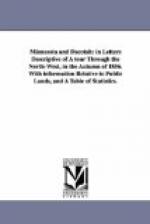The town of Humboldt is the county seat for Sherburne county. It lies between the Mississippi and Snake rivers. The part of the town which I saw was a very small part. Mr. Brown’s residence, which is delightfully situated on the shore of a lake, is at once the court house and the post office, besides being the general emporium and magnate of Humboldt business and society. Furthermore, it is the place where the stage changes horses and where passengers on the down trip stop to dine. It was here we stopped to dine; and as the place had been a good deal applauded for its table-d’hote, a standard element of which was said to be baked fish, right out of the big lake, I at least had formed very luxurious expectations. Mr. Brown was away. We had met his lively countenance on his way up to a democratic caucus. Perhaps that accounted for our not having baked fish, for fish we certainly did not have. The dinner was substantial, however, and yielded to appetites which had been sharpened by a half day’s inhalation of serene October air. We had all become infused with a spirit of despatch; and were all ready to start, and did start, in half an hour from the time we arrived at the house.
We had not proceeded far after dinner before meeting the Monticello stage, which runs between the thriving village of that name— on the west bank of the Mississippi— and St. Paul. It carries a daily mail. There were several passengers aboard.
One little incident in our afternoon travel I will mention, as it appeared to afford more pleasure to the rest of the passengers than it did to me. Where the stage was to stop for fifteen or twenty minutes, either to change mail or horses, I had invariably walked on a mile, if I could get as far, for the sake of variety and exercise. So when we came to the pretty village of Anoka (at the mouth of Rum River), where the mail was to be changed, I started on foot and alone. But unfortunately and unconsciously I took the wrong road. I had walked a mile I think— for twenty minutes at least had expired since I started— and being in the outskirts of the town, in the midst of farms and gardens, turned up to a garden-fence, on the other side of which a gentleman of professional— I rather thought clerical appearance— was feeding a cow on pumpkins. I had not seen pumpkins so abundant since my earliest youth, when I used to do a similar thing. I rather thought too that the gentleman whom I accosted was a Yankee, and after talking a few minutes with him, so much did he exceed me in asking questions, that I felt sure he was one. How thankful I ought to be that he was one! for otherwise it is probable he would not have ascertained where, and for what purpose, I was walking. He informed me I was on the wrong road; that the stage took a road further west, which was out of sight; and that I had better go on a little further and then cross the open prairie. Then for the first time did I notice that the road I had taken was but a street,




